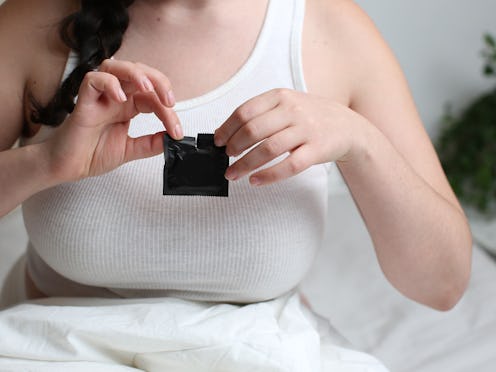Life
Yes, You Need Protection For Oral Sex — But Here's How Many People Actually Use It

The one and only time I ever tried to use a condom for oral sex was during a college hookup. After the classmate I brought back to my bedroom went down on me and asked me to reciprocate the favor, I said, “only if we use a condom.” After I put it on, he got on top of me, thinking the condom meant I wanted to have intercourse. I told him I wasn’t ready for that, and I don't think he was either. Unsure what to do, we just went to sleep. It was as awkward as it sounds. To avoid uncomfortable misunderstandings like that, I decided I wouldn’t even try to use condoms for oral in the future.
I’m not alone. In fact, according to a recent YouGov survey, “34 percent of Americans never use protection during oral sex.” That means around two-thirds sometimes do, and I'd bet far fewer always do. And let’s not even get started on dental dams. I’ve never had a partner who owned one, and I rarely see them in sex shops. I tried to bring one into my bedroom recently, and my partner didn’t even know what it was.
“It honestly doesn't surprise me at all to hear that people are not using condoms during blow jobs or dental dams during cunnilingus,” Kenna Cook, a sex educator at O.school, tells Bustle. “Tell me the last time you saw a movie or TV show where the coupe on-screen stopped to use protection before oral? Rarely, if ever.”
Many people forego condoms during oral sex for the same reason they forego them during penetrative sex, says Cook: because they’ve been taught they don’t feel good. “There are few models of how to engage in pleasurable sex while using protection,” she explains.
“The taste of condoms, even the flavored ones, is repulsive and I try to avoid it at all costs,” Cali*, 28, tells Bustle. “It's like trying to enjoy a tasty lollipop without taking off the wrapper.”
Many people feel similarly, and instead of using protection, they’ll stick to one sexual partner. “Since we use condoms for pregnancy rather than STI protection, it doesn't really make sense to use them for non-pregnancy causing activities,” Rachel, 31, tells Bustle.
But regardless of what kind of relationship you’re in, you're putting yourself at risk for STIs with unprotected oral sex. Herpes, gonorrhea, syphilis, chlamydia, HIV, hepatitis, HPV, and genital warts are all spreadable through oral sex. You can test for some of these, but you can't test for all of them, so you can never completely eliminate the risk for STIs through oral unless you use protection. If you’re not willing to use barriers and want to experience sexual pleasure with a partner, Cook recommends instead focusing on mutual masturbation, external stimulation, or sex toys.
If you want to have oral sex and don’t want to use protection, the best way to minimize your STI risk is to get tested regularly. Cook recommends getting tested two weeks after having unprotected sex (yes, oral sex is sex). “Many STIs don't show any symptoms, so the best way to know what's up down there is to get a full blood and urine panel that tests for chlamydia, gonorrhea, syphilis, HIV and Hep C,” she says.
"And make sure you talk to you partner," she says. "Talking about safe sex is the way we have safe sex! There seems to be a stigma that only 'dirty' people talk about safe sex and get tested regularly. The truth is that happy, ethical sluts get tested often and have the best sex lives."